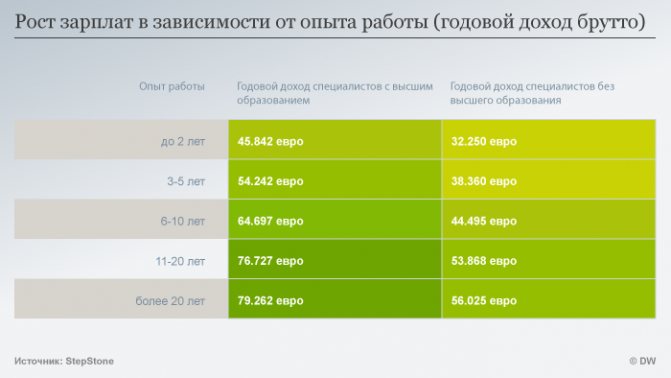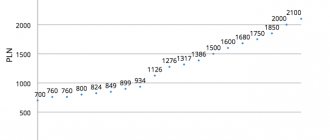This page provides data on average and minimum wages in Germany by year, both summary data and separately for many professions. Special tables present average salaries in European countries and the European Union. Also in our special catalog you will find information on salaries by profession in Germany. In addition, a separate page of the site is devoted to information about taxes and fees on salaries in Germany (gross/net).
- Information on the page:
- Minimum salary in Germany
- Average salary in Germany
- Wage increase index in Germany
- Salaries of men and women
- Factors influencing salary levels
- Salaries by profession - catalog
- useful links
- Comments and questions
§ Minimum salary in Germany for 2021, 2021
Since 2015, a minimum wage law has been in force throughout Germany (Mindestlohngesetz vom 11. August 2014 (BGBl. I S. 1348)). The initial minimum rate was 8.50 euros per 1 hour of work.
Therefore, every worker in Germany, with some exceptions, is entitled to a legally stipulated minimum wage. This law also regulates the deadline for payment of wages, namely: wages must be paid to the employee within the period agreed upon with him, but no later than the last working banking day in the month following the month in which the work was performed.
The minimum wage in Germany for 2021 is 9.50 euros gross per 1 hour of work.
Minimum wage in Germany
What is the minimum wage in Germany? The minimum wage in Germany for 2021 is 9.50 euros gross per 1 hour of work . In some industries, the law establishes higher minimum wage rates, exceeding the specified minimum wage rate by 1 - 2 euros. The highest minimum wage is established in construction for skilled workers and exceeds the general minimum wage rate by more than 50% . The following table calculates the minimum wage for 1 day, week and month, based on the total hourly rate of the minimum wage.
Table 1: Minimum wage in Germany for 2021
| Period of time | In Euro | In rubles |
| 1 hour | 9.50 | 868.89 |
| 1 day (8 hours) | 76.00 | 6’951.10 |
| 1 week (40 hours) | 380.00 | 34’755.48 |
| 1 month (160 hours) | 1’520.00 | 139’021.94 |
Changes in the minimum wage in Germany
The minimum wage in Germany increases every year. The following Table 2 presents data on changes in the minimum wage since 2015.
Table 2: Changes in the minimum wage in Germany by year
| date | Hourly rate | Monthly payment, 160 hours |
| 01.01.2015 | 8.50 € | 1360.00 € |
| 01.01.2017 | 8.84 € | 1414.40 € |
| 01.01.2019 | 9.19 € | 1470.40 € |
| 01.01.2020 | 9.35 € | 1496.00 € |
| 01.01.2021 | 9.50 € | 1520.00 € |
| 01.07.2021 | 9.60 € | 1536.00 € |
| 01.01.2022 | 9.82 € | 1571.20 € |
| 01.07.2022 | 10.45 € | 1672.00 € |
Interesting facts about the minimum wage in Germany
According to the Federal Statistical Office, in Germany, before the introduction of the minimum wage law, there were about 4 million jobs paying less than the original minimum wage of 8.50 euros per hour of work. In East Germany this represented 11% of all jobs. After the introduction of the minimum wage law, the number of minimum wage workers amounted to 1.9 million jobs. Students and trainees earn less than the minimum wage. More women than men work at the minimum wage.
For information on the minimum pension in Germany, see the following page: Minimum, social pension in Germany
Information about benefits for the unemployed in Germany can be found on our website page: Unemployment benefits in Germany
The German labor market and its specifics
Today, more than 25,000 engineering vacancies remain unfilled on the German labor market. The reason for this situation is demographics. A third of construction specialists who work have already crossed the age of 50.
Number of vacancies in Germany in the second quarter of 2021
Additionally, about 35% of engineers retire each year. While no more than 5,000 people graduate from universities with a degree in civil engineering in Germany every year.
The situation in the mechanical engineering field is not the best: 70,000 specialists are due to retire this year. They will be replaced by no more than 35,000 young design engineers in Germany.
Electronics engineer is already a rare profession today. More than 50,000 specialists in this field retire every year. And the country's universities graduate no more than 15,000 young engineers.

Design engineers are no less in demand on the German labor market. The situation is the same in the energy sector: Germany is in dire need of specialists in this area.
How to get to work in Germany?
To be able to work as an engineer in Germany, there are two ways: graduate from one of the relevant German educational institutions or confirm an existing diploma issued by a Russian university.
Many people think that the first option is only acceptable for those who are 17–20 years old. But this is not true: in Germany, studying at university at 40 is a very common occurrence. People here retire at 67, so there is still time to work.
Moreover, the Germans believe that until the age of 25, people do not yet fully understand what they want to do as a job, so retraining at a more mature age does not raise any questions for anyone.
Young Russians can also get an education in Germany and then work here as an engineer.
The only condition is excellent knowledge of German. Although some faculties teach in English, without knowledge of German it is unlikely that you will be able to enroll in studies.
If we are talking about graduates of universities/institutes in Russia, Ukraine and other post-Soviet countries, then knowledge of German allows Russians to work in Germany legally and stay in this country to live. Moreover, this applies to both young specialists and people who have been working for 7–10 years, for example, as a designer, energy engineer, etc.
To begin with, foreign students are invited to an internship in Germany. And then, if everything suits the employer, a contract is concluded for a certain time. Then the cooperation agreement is either extended or closed: it all depends on the knowledge of the specialist, his desire to work and earn money.
§ Average salary in Germany, 2021, 2021
The average salary in Germany is not set by law, it varies depending on various factors, which include: state or region of Germany, level of education, company size, industry, gender and some other factors that are discussed below on this page.
The average gross salary in Germany for 2020 is 3,975.00 euros for 1 month of work.
Average salary in Germany
The average gross salary in Germany, including all allowances, additional bonuses and payments, before taxes and fees for 2021 was 3,975.00 euros for 1 month of work.
You can find out detailed information about what the average salary in Germany is per month and year, net and gross, on a separate page of our website.
§ Average gross salaries of engineers in Germany
Information based on data from the Federal Office of Statistics for 2010. Shown are gross salaries before taxes and fees (Taxes and deductions in salaries in Germany)
Table 1. Average salary of engineers, technologists, mechanics by profession
| Profession | Salary for 1 hour, euro | Monthly salary, euros | Monthly salary, rubles |
| Mechanical Engineers | 32.08 € | 5’422.00 € | 497’822.01 |
| Electrical Engineer | 32.09 € | 5’428.00 € | 498’372.91 |
| Civil Engineer | 25.66 € | 4’435.00 € | 407’200.41 |
| Surveyor | 24.22 € | 4’131.00 € | 379’288.59 |
| Foundry engineer | 37.23 € | 6’201.00 € | 569’346.06 |
| Production engineers | 32.44 € | 5’474.00 € | 502’596.40 |
| Other engineering groups | 29.16 € | 4’948.00 € | 454’301.61 |
| Chemical engineer | 33.36 € | 5’618.00 € | 515’817.79 |
§ Index of wage increases in Germany, changes in real and nominal wages
Further in table 3, as well as in subsequent diagrams, the change in wages in Germany is presented by year. Two indices are presented as indicators of changes in wages: the Real Wage Index (German: Reallohnindex) and the Nominal Wage Index (German: Nominallohnindex). Both indices represent the percentage change in wages relative to the year, taken as 100%.
Nominallohnindex is the % change in wages compared to the year taken as the base year.
Reallohnindex is Nominallohnindex adjusted to the consumer price index, i.e. represents a real increase in wages.
Table 3: Changes in monthly gross wages in Germany by year
| Calendar year | Salary, in euros | Reallohnindex, in % | Nominallohnindex, in % |
| 2020 | 3’975.00 | 104.1 | 110.1 |
| 2019 | 3’994.00 | 105.3 | 110.9 |
| 2018 | 3’880.00 | 104.1 | 108.0 |
| 2017 | 3’771.00 | 102.8 | 104.9 |
| 2016 | 3’703.00 | 101.8 | 102.3 |
| 2015 | 3’612.00 | 100.0 | 100.0 |
| 2014 | 3’527.00 | 97.7 | 97.4 |
| 2013 | 3’449.00 | 95.9 | 94.8 |
| 2012 | 3’391.00 | 96.0 | 93.5 |
| 2011 | 3’311.00 | 95.5 | 91.2 |
Diagram 1. Indices of changes in wages by year
Conversation about increasing wages at a company in Germany
In Germany, it is considered normal to talk to your boss and immediate supervisor about a salary increase. Leaders are ready for and expect these conversations. When talking with your boss about a salary increase, as advised in Spiegel magazine, you need to be guided by the following rules:
- Don't be shy about talking to your boss about a salary increase.
- You need to have an idea of the desired premium.
- The desired amount of money must be justified by your qualifications and knowledge.
- It is recommended to talk about salary increases once every year and a half.
- The reasons for raising your salary need to be chosen wisely, the main one being your contribution to the company's activities.
Class Information
Since January 1, 2013, the corresponding class of payroll tax in Germany has been registered in the electronic income tax calculation functions. This procedure replaced calculations of amounts that were performed on paper.
Using automatic calculation procedures and a table of tax deductions, you can determine the appropriate class of worker in Germany, as well as the amount of payments to the state. This table shows what salary tax in Germany an employee must be charged and which tax class corresponds to which income.

§ Salaries of men and women, comparison of salaries by year
In Germany, real wages are influenced by various factors, including differences between the real wages of men and women. As can be seen from the following Table 4, men in Germany earn more than women. The following table presents data on changes in wages (gross) by year in Germany for full-time employment and all additional payments, divided by the average salary of men and women.
Table 4: Comparison of average salaries of men and women in Germany
| Calendar year | Salary of men, euros per month | Women's salary, euros per month | Difference, euro |
| 2020 | 4’146.00 | 3’578.00 | 568.00 |
| 2019 | 4’181.00 | 3’559.00 | 622.00 |
| 2018 | 4’075.00 | 3’432.00 | 643.00 |
| 2017 | 3’964.00 | 3’330.00 | 634.00 |
| 2016 | 3’898.00 | 3’258.00 | 640.00 |
| 2015 | 3’810.00 | 3’161.00 | 649.00 |
| 2014 | 3’728.00 | 3’075.00 | 653.00 |
| 2013 | 3’645.00 | 3’007.00 | 638.00 |
| 2012 | 3’595.00 | 2’925.00 | 670.00 |
| 2011 | 3’508.00 | 2’861.00 | 647.00 |
As can be seen from table 4 above, in 2021 women on average earned €568.00 less per month, representing a difference of 13.7%. Over the past few years, the difference in wages between men and women has been gradually narrowing.
For information on the average pension in Germany, see the following page: Average pension in Germany

The Germans can safely be called a “nation of engineers” - almost every fifth person now receives education in this field. The figure of 22% is announced by the Organization for Economic Co-operation and Development (OECD)
The fact that the engineering profession is so popular in Germany is easily explained. The country has many world-famous industrial enterprises, and engineers for these companies are simply worth their weight in gold. First of all, we are talking about the automotive industry - for example, BMW and Volkswagen offer profitable positions. Let’s figure out how much they are willing to pay specialists in such companies.
Chemists have the biggest income
In general, engineer salaries are among the highest in Germany. First of all, its volume depends, of course, on qualifications and work experience. Thus, young professionals can receive from 36 to 45 thousand euros per year. An employee with ten years of experience can count on 50-65 thousand. And specialists with longer experience get up to 70 thousand.
The Association of German Engineers (VDI) voices slightly more optimistic figures:
- for young professionals - from 48 thousand
- with work experience of two years or more - from 66 thousand
How much engineers earn in Germany depends primarily on their specialization. According to research, the richest people are not automotive geniuses. The Hans-Böckler-Stiftung Institute for Economic and Social Sciences (WSI – Hans-Böckler-Stiftung) places representatives of the chemical and pharmaceutical industries in first place (they earn an average of about 83 thousand euros per year). We are talking about employees of, for example, companies such as BASF, Henkel and Bayer. Next come mechanical engineers (67,500 euros), electrical engineers (63,192 euros), and software engineers (55,776 euros). We are talking about specialists with more than two years of experience. The difference between large (more than 500 employees) and small enterprises (up to 100) is almost 8 thousand per year.

Photo: nitpicker/Shutterstock.com
Geography affects your wallet
And we are not just talking about the traditional difference between eastern and western lands. The concentration of industrial enterprises in certain regions is also important. For example, these are Bavaria, Baden-Württemberg and Saxony, where traditionally there are more automobile companies, construction firms and chemical concerns. Accordingly, the further north you go, the less engineers earn.
If we take the “East-West” opposition, we can trace the difference in salaries. It can reach approximately 600 euros per month: compare the eastern 4,700 euros and the western 5,292.
Salaries also differ depending on whether the company has a tariff agreement. If the enterprise provides it, the average salary for an engineer in the country will be 5,502 euros per month. Without a contract it will be 4826 per month (675 euros higher).
How to become an engineer in Germany: confirmation of qualifications
If you received your engineering education at a university other than Germany, the employment process may be significantly delayed for you. The fact is that the country has a separate regulation for engineers, according to which only a specialist who graduated from an educational institution in Germany and has a work permit can officially be classified as this profession. This means you need to prove that your education and skills meet German standards.

There are two ways here. The first is just confirmation of the diploma. This procedure is carried out by employees of the Central Office for the Verification of Foreign Documents (Zentralstelle für ausländisches Bildungswesen, ZAB).
You can find out whether your diploma is listed in Germany on the special portal Anabin. It contains reference information for foreigners wishing to obtain higher education in Germany or confirm their existing qualifications. The site only works in German. It’s a good motivator to learn a language, especially since you’ll need it for work anyway.
The second way is confirmation of qualifications in general. This means that you will have to take either courses at any technical university or internship at an enterprise (there are even options with subsequent employment, for example, at Porsche). And this method is more profitable, because employers are much more willing to trust practical results than documents alone. To confirm your qualifications, you must contact one of the state engineering chambers (Ingenieurkammer).
It is important to know the List of documents to confirm a foreign diploma
- application for confirmation
- certificate confirming knowledge of the German language
- certificate of secondary education and insert
- diploma and insert (both are notarized copies)
- your university's curriculum, which lists all subjects studied and the full number of hours (also in German)
- first page of passport (copy)
- autobiography.
Alle Fotos: shutterstock.com
August 26, 2021 at 08:25
Views: —
Society, Useful
Evgenia Krivitskaya
§ Factors influencing salary levels in Germany
Salary levels by region, state of Germany
According to data from the German Statistics Authority for 2019, the level of wages in Germany depends on the region of Germany and can differ by up to 80%. The highest salaries were noted in the states of Baden-Württemberg, Bavaria, Bremen, Hesse, North Rhine-Westphalia, Saarland , followed by Lower Saxony, Hamburg, Rhineland-Palatinate , then Berlin, Schleswig-Holstein, Saxony, Thuringia and finally in at the bottom of the list are Mecklenburg-Vorpommern, Brandenburg, Saxony-Anhalt .
Thus, the highest salaries are received in the southern region of Germany, the lowest in the countries of the former East Germany and the GDR.
Salary depending on the size of the enterprise
At larger enterprises, wages are significantly higher than wages at small firms for the same professions. For example, the salary of doctors in an enterprise with more than 1,000 employees is 30% different from the salary of doctors in an enterprise with less than 500 employees. The salary of engineers under the same conditions may differ by up to 10%.
Salary depending on education level
The level of education also affects the salary; the higher the education, the higher the salary.
Salaries by industry
Wages also depend on the industry in which a person works. The following list presents industries starting with those with the highest wages.
- Banks
- Pharmaceutical industry
- Automotive industry
- Telecommunications
- Chemical industry
- Mechanical engineering
- Medical equipment
- Space and air transportation
- Insurance
- Energy
- Trade
- Agriculture
- Health and Social Services
- Agencies and advertising
- Leisure and tourism
- Education
- Craft production
- Hotels and gastronomy
Honorary professions in Germany
Some of the most respected and honorable professions in society are those of a teacher, firefighter, and police officer.
Teacher
In Germany, a school teacher's salary is about 3,500 € per month. The worker’s salary depends on the educational institution and is divided into categories.
Incomes also differ among the federal regions of Germany. Let's say an employee of a primary school in Saxony receives 3,270-4,471 € gross per month, in Baden-Württemberg 3,532-4,595 €, and in Bavaria approximately 3,437-4,473 € per month.
University-graduated specialists who have not yet passed two teacher exams confirming the level of knowledge of the employee or have mastered a discipline that is not common at the university can have a fairly low paid rate of € 2,700 gross. And teachers in private schools and directors do not have a clearly established payment rate.
Firefighter
The monthly salary of a specialist directly depends on the position held, which is divided into various categories. It should be noted that while still a cadet, a student can receive 1,000 € per month, which is almost 74,000 rubles. Salary categories differ based on the region in which the firefighter works. Thus, the average income of an employee in category A7 (fire brigade chief) in Bavaria is about 2,320 € gross per month, in Bremen 2,215 €, while in Hesse only 2,160 €. Category A9 (chief fire chief) is paid much better, since the minimum salary per month is about 2,426 € gross, regardless of the federal region.
Police officer
In this profession, salaries are also calculated by category. For example, in Bavaria, salaries for police officers start from category A3 from 2,200 € gross per month, and in Saxony from only 1,821 €.
A federal police officer in Munich earns approximately €2,357 gross.
§ Salaries by profession - catalog of professions and average salaries in Germany
Deutsche Welle conducted a study and published information on which professions in Germany will be most in demand in the coming years. The first 5 places are occupied by the following professions:
- Engineers in construction and energy
- Information Security Workers
- Programmers
- Economists
- Sales Managers
The following is a catalog of information on salaries by profession in Germany. To go to information about salaries by profession, follow the following links.
- architects' salaries
- salaries of librarians, archivists, museum workers
- accountants' salaries
- salaries of drivers, truckers, couriers
- salaries of doctors, nurses, surgeons, dentists
- loaders' salary
- salaries of janitors, cleaners
- salary of housewives, governesses
- salaries of engineers, technologists, mechanics
- salaries of brokers, realtors, intermediaries
- massage therapists' salary
- salaries of managers, executives, managers, directors
- salaries of musicians, artists, artists, cultural figures
- nannies salary
- salary of hairdressers, cosmetologists
- salaries of translators, interpreters and translators
- pilots' salary
- salaries of cooks and kitchen workers
- salaries of police officers, firefighters, security guards, judges
- postmen's salary
- salaries of programmers, IT specialists
- salaries of salespeople, cashiers
- wages of workers, laborers
- welders' salary
- salaries of signalmen, radio operators, telephone operators
- salaries of nurses, social workers, orderlies, staff
- mechanics' salary
- builders' salary
- salaries of turners, millers, grinders
- salaries of teachers, instructors, educators, trainers, educators
- salaries of florists, gardeners, garden and park workers
- photographers' salaries
- wages of watchmakers, watchmakers
- salaries of miners, miners
- salary of seamstresses, tailors, shoemakers, leather workers
- salaries of economists, financiers, bankers, insurers
- electricians salary
Salary level by profession
This section presents monthly, starting, average salaries by industry.
Information Technology
| Professional area | Salary - gross | Salary - net |
| Database development | 3 568 € | 2 266 € |
| Equipment development | 3 916 € | 2 442 € |
| Mobile development | 3 783 € | 2 376 € |
| SAP consulting | 3 916 € | 2 442 € |
| Software development | 3 700 € | 2 333 € |
| System administration | 3 664 € | 2 315 € |
| Web development | 2 948 € | 1 940 € |
| Business Informatics | 3 751 € | 2 359 € |
§ Useful links
- Minimum Wage Commission, Mindestlohnkommission
- Ministry of Labor and Social Affairs, Minimum Wage
- Minimum Wage Law, Mindestlohngesetz
- Statistical Office, Statistisches Bundesamt (Destatis)
- Stepstone Salary Information
Footnotes:
The euro exchange rate in the tables is taken as of April 8, 2021 and is 91.46 rubles at the rate of the European Central Bank. Exchange rates in Germany
- Pages:
- 1
- Average and minimum salaries in Germany
- Average salaries in EU countries
- Taxes and duties on salaries in Germany
- Average salaries by profession in Germany
- Average salary in Germany in 2021 per month in rubles and euros
- Related topics:
- Minimum pension in Germany
- Labor legislation in Germany
- Permit to stay and work in Germany
- How to find a job in Germany
- Help with finding a job in Germany
- Free German courses in Germany
Salary trends

The national economy is a constantly changing system. Average salaries can fluctuate between several hundred euros per month, but over the past 5-8 years it has remained consistently at the level of 2300-2800 €. If we consider the general trends in the German labor market, it is worth noting that the changes are mainly favorable for workers.
- Due to the overall growth of the EU economy, the number of vacancies is increasing.
- The increase in wages, although insignificant, confidently outstrips the rise in prices.
- In addition to cash payments, social guarantees are expanding.
- The constant lack of highly qualified personnel significantly affects the salaries in Germany.
In pursuit of unique specialists, German employers are ready to offer increasingly favorable conditions. Less-skilled workers can also expect average wages and the purchasing power of the European currency to continue to rise steadily.
How much is the salary tax in Germany?
It would be nice if we had the opportunity to declare a specific percentage of taxes in Germany. Here is the gross amount, subtract taxes from it - you get the net. However, the German tax system is also one of the most complex.
The main fees paid by the employee are:
- Income tax – this value can vary from 14% to 45%.
- “Church tax” - paid by parishioners of some denominations, but may not be collected upon official withdrawal from the Kirchensteuer parish.
- Solidaritätszuschlag is the so-called. a solidarity tax (about 5.5%), the funds of which are aimed at equalizing the development gap between the East and West of the country. From January 2021, it is only levied on those whose annual gross income is more than €73,800.
- Social benefits : medicine, pension funds, unemployment, loss of ability to work.
In addition to the fact that each of the values itself is changeable, payments also depend on the number of children (more about child care benefits), geography of residence, tax class, gross value, etc.
Example of taxes . A German from the western part of the country with one child and 3rd tax class will receive:
| Gross | Taxes and fees | Net |
| 2 000 € | 429,67 € | 1 570,33 € |
| 3 000 € | 830,63 € | 2 169,37 € |
We do not aim to reveal all the nuances of German taxation in this small section, but only want to show the approximate differences between gross and net.
Minimum salary after taxes (net)
To calculate the net average monthly minimum wage, we will use the above data. Let’s also look at the data from the Federal Office of Statistics, which shows that with full-time work, the net share of gross wages ranges from 59% to 67%.
The spread is quite large, so for calculations we will use the average of these parameters, namely net = 63% of gross .
Minimum salary per month in net (rates for January 2021):
| Euro | 958 € |
| Rubles | 86 979 ₽ |
| Hryvnia | 33 280 ₴ |
| Belorussian rubles | 3,050 BYR |
Have the numbers become less beautiful when taking into account travel and accommodation? But we are still talking only about the minimum size. Let's look at the averages.











